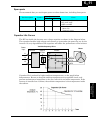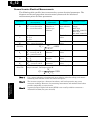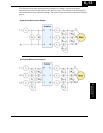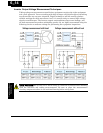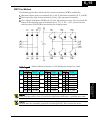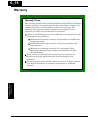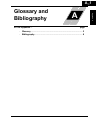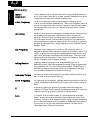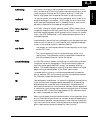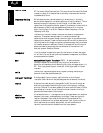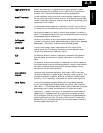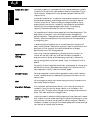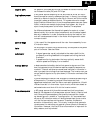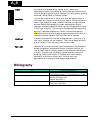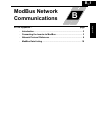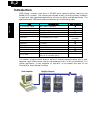
D
C Braking
The inverter DC braking feature stops the AC commutation to the
motor, and sends a DC current through the motor windings in order
to stop the motor. Also called “DC injection braking,” it has little
effect at high speed, and is used as the motor is nearing a stop.
D
eadband
In a control system, the range of input change for which there is no
perceptible change in the output. In PID loops, the error term may
have a dead band associated with it. Deadband may or may not be
desirable; it depends on the needs of the application.
D
igital Operator
P
anel
For Hitachi inverters, “digital operator panel” (DOP) refers first to
the operator keypad on the front panel of the inverter. It also includes
hand-held remote keypads, which connect to the inverter via a cable.
Finally, the DOP Professional is a PC-based software simulation of
the keypad devices.
D
iode
A semiconductor device that has a voltage-current characteristic that
allows current to flow only in one direction, with negligible leakage
current in the reverse direction. See also
Rectifier
.
D
uty Cycle
1. The percent of time a square wave of fixed frequency is ON (high)
versus OFF (low).
2. The ratio of operating time of a device such as a motor to its
resting time. This parameter usually is specified in association
with the allowable thermal rise for the device.
D
ynamic Braking
For the L200 inverter models, the braking unit and braking resistor
are optional (external) components. The dynamic braking feature
shunts the motor-generated EMF energy into a special braking
resistor. The added dissipation (braking torque) is effective at higher
speeds, having a reduced effect as the motor nears a stop.
Error
In process control, the error is the difference between the desired
value or setpoint (SP) and the actual value of a the process variable
(PV). See also
Process Variable
and
PID Loop
.
EMI
Electromagnetic Interference - In motor/drive systems, the switching
of high currents and voltages creates the possibility of generating
radiated electrical noise that may interfere with the operation of
nearby sensitive electrical instruments or devices. Certain aspects of
an installation, such as long motor lead wire lengths, tend to increase
the chance of EMI. Hitachi provides accessory filter components you
can install to decrease the level of EMI.
F
our-quadrant
o
peration
Referring to a graph of torque versus direction, a four-quadrant drive
can turn the motor either forward or reverse, as well as decelerate in
either direction (see also
reverse torque
). A load that has a relatively
high inertia and must move in both directions and change directions
rapidly requires four-quadrant capability from its drive.
A
−
3
Appendix A



